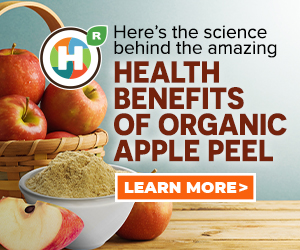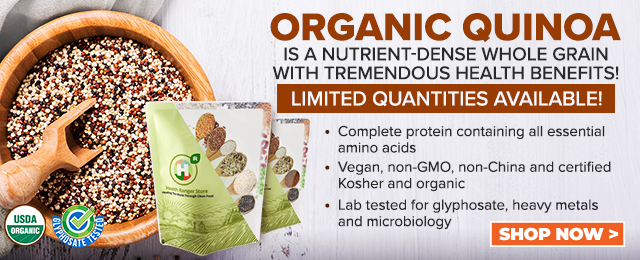
Food-borne poisons: Diet changes can reduce contamination risk
Saturday, September 07, 2013 by: Raw Michelle
Tags: food contaminants, exposure, e. coli
- Gardening tips: 15 Simple tricks to double your garden’s yield this season
- TAKE IT DOWN Act advances in Congress amid free speech concerns
- Survival 101: Dangerous places to avoid when disaster strikes
- Nature’s arsenal: How plant compounds power military survival and healthcare in crisis
- Kawasaki unveils rideable ROBOT HORSE powered by hydrogen
- Amazon's Kuiper satellite launch delay highlights uphill battle against Musk's Starlink
- DOJ and ATF kill Biden’s “Zero Tolerance” firearms dealer policy
- Criminal referral requests filed against Fauci and top COVID officials in seven states
- “Prepare Tribe: Prepare, Protect, Provide” on BrightU: How to build a disaster-proof shelter in the middle of nowhere
- Hospital staffers sound alarm after 10 nurses were diagnosed with BRAIN TUMORS
- Barley: A nutrient-dense ancient grain with modern benefits
- Germany prepares students for war amid growing security concerns
- New studies ignite debate: Fluoride linked to autism and ADHD, prompting calls for policy reassessment
- Rafael Medoff explores the role of Jabotinsky in the rise of Revisionist Zionism in “Militant Zionism in America”
- Yoga and autism: A science-backed look at how a simple practice is transforming behavior and movement in children with ASD
- Trump escalates tariffs to 145% on Chinese goods amid fentanyl crisis, escalating trade tensions
- POLL: U.S. support for Israel drops to lowest level in decades amid Gaza War
- Sovereign debt paradox: U.S.-China mutual holdings fuel geopolitical tensions
- Tulsi Gabbard leads charge against the Biden regime’s global censorship of the 'Disinformation Dozen'
- Fauci is back in the limelight, and he’s busy promoting a future COVID or FLU pandemic
- Aerosolized bioweapons? Strange “diploid biomasses” falling out of the sky in Florida captured under the microscope
- Analysis: The coming economic collapse, a mass uprising and Trump's three secret weapons to halt the growing revolt
- Widespread social and economic unrest: Steve Quayle issues urgent financial warning of imminent asset collapse in new interview with Mike Adams
- Kiss Your Genetic Privacy Good-Bye! 23andMe Gets Green Light to Sell Your Intimate Genetic Details to Anyone They Want
- Tulsi Gabbard takes aim at censorship: Justice for the ‘Disinformation Dozen’
- Mike Adams releases country western hit single: Goin’ Back in Time is Comin’ Home
- U.S. lawmakers investigate Meta over alleged China collaboration
- CLOT SHOT PLANDEMIC UNFOLDING: Fibrous, rubbery clots caused by covid injections have prion-like seeding activity
- Chemtrails unveiled: How the CIA and Big Business are manipulating the weather for profit
- How Israeli military-connected corporations are secretly controlling your online privacy
- European Court of Justice: Healthcare professionals who promoted or administered COVID-19 vaccines are CRIMINALLY LIABLE for any harm caused
- DEATH by VACCINE or face PRISON time: Canadian Freedom Convoy leaders CONVICTED for protesting forced vaccination during the Covid Plandemic
- Defunding DEADLY mRNA jabs: Government funding for mRNA technology being scrutinized and sidelined until proven "safe and effective" for real
- Federal employees whine over DOGE's new directive requiring them to do a 5-point summary of weekly accomplishments
- U.S. approves new Russian ambassador as diplomatic thaw continues
- Curcumin’s ancient healing power supercharges muscle recovery, and its effects are compounded with anti-inflammatory foods and supplements
- Newly released JFK files reveal Pentagon's role in creating Lyme disease and covid in the same lab
- Analysis: The coming economic collapse, a mass uprising and Trump's three secret weapons to halt the growing revolt
- Mike Adams releases country western hit single: Goin’ Back in Time is Comin’ Home
- Aerosolized bioweapons? Strange “diploid biomasses” falling out of the sky in Florida captured under the microscope
- Kiss Your Genetic Privacy Good-Bye! 23andMe Gets Green Light to Sell Your Intimate Genetic Details to Anyone They Want
- Dr. Mike Yeadon releases 15-minute testimony - WATCH - about genocidal intent of COVID “vaccines”
- Trump reverses course on Gaza plan, says “nobody is expelling Palestinians”
- MEDICAL BOMBSHELL: FDA admits Covid mRNA 'Vaccines' CAUSE CANCER
- European Court of Justice: Healthcare professionals who promoted or administered COVID-19 vaccines are CRIMINALLY LIABLE for any harm caused
- The Health Ranger releases “Vaccine Zombie” song and music video, using AI-animated zombies for the music video
- 5 Simple steps to boost your brainpower: How to strengthen executive function in a distracted world
- A lack of integrity in Academia: Harvard professor found GUILTY of fraudulent research to promote CRT theory
- Federal employees whine over DOGE's new directive requiring them to do a 5-point summary of weekly accomplishments
- EPA advisor admits the agency is funneling billions to climate groups ahead of Trump’s return to White House
- California's social media censorship law struck down: A victory for free speech or a threat to online safety?
- Space war brewing? Russia threatens to destroy Starlink satellites
- Survival 101: Effective EMF blocking techniques
- Rep. Nancy Mace introduces bill to ban biological males from female facilities on federal property
- Red Cross issues warning to stop blood plasma donations from vaccinated people
- Scientists confirm: GENIUS brain function can be spontaneously unleashed in humans without any apparent cause
- EPA advisor admits the agency is funneling billions to climate groups ahead of Trump’s return to White House
- HYSSOP: What research reveals about the health benefits of this ancient holy herb
- Two containers with completed ballots fall out of truck in Florida
- Newly released JFK files reveal Pentagon's role in creating Lyme disease and covid in the same lab
- Global leaders unite to clamp down on “misinformation” with UN-backed Cascais Declaration
- BREAKING: 2025 NDAA authorizes mandatory military draft of WOMEN across America… as Pentagon pursues global NUCLEAR war with both Russia and China at the same time
- Michael Yon warns of a ZIONIST TAKEOVER in Trump’s second administration
- Ozempic and Wegovy weight loss drugs are injectable LIZARD VENOM PEPTIDES that may unleash a devastating wave of organ failure… side effects align with symptoms of SNAKE BITES
- The Health Ranger releases “Vaccine Zombie” song and music video, using AI-animated zombies for the music video
- Mike Adams releases country western hit single: Goin’ Back in Time is Comin’ Home
- BOMBSHELL: DNA testing kits are a SCAM to develop ethnic-specific bioweapons
- Israeli soldiers accused of even more torture and abuse in the West Bank
- These 13 countries just signed an agreement to engineer a global FAMINE by destroying food supply
- NASA admits that climate change occurs because of changes in Earth’s solar orbit, and NOT because of SUVs and fossil fuels
- Fully vaccinated about to see “tsunami” of illness and death, warns virologist
- RFK Jr. clears key hurdle: Sen. Susan Collins backs controversial HHS nominee, signaling a new era for health policy
Preschool children are most vulnerable
A study carried out by scientists at UC Davis and UCLA found that children and family members were most vulnerable to pesticides, metals and other toxins. The researchers looked at 364 children and found that all of them exceeded cancer benchmarks for arsenic, dieldrin, DDE and dioxins. This data is particularly worrisome because of the effects that some toxins can have on the developing brain.Arsenic is a potent poison, and long-term exposure to even small amounts can lead to severe vitamin A deficiency, heart disease and night blindness (difficulty to see in low light).
Dieldrin is an organic pollutant usually used as a pesticide. Symptoms of poisoning include convulsions, as well as neurological and liver damage.
DDE is a toxic compound that can be passed on to infants via breast milk. Once exposure occurs, DDE is neurotoxic, and can cause hormonal changes and oxidative damage.
Dioxins are highly toxic substances that cause developmental problems, weaken immunity, and reduce fertility. It is mostly found in animal products and meats, including seafood.
How to lower toxic exposure
The scientists at UC Davis and UCLA have put together a few tips that can help families reduce exposure to toxins. "We need to be especially careful about children, because they tend to be more vulnerable to many of these chemicals and their effects on the developing brain," explained Hertz-Picciotto, one of the researches involved in the study.Some of the simplest, scientifically confirmed ways to lower toxic exposure is to opt for organic produce because it is free of pesticides, and to reduce the consumption of meat and animal products, since they contain high levels of organic pollutants. For infants, scientists recommend the use of organic milk. As far as seafood is concerned, the researchers warn against the danger of mercury poisoning, and suggest that some smaller fish may have lower mercury levels because they are lower on the food chain.
Acrylamides can be completely eliminated from the diet by removing processed grains, as well as fried and baked foods. Deborah Bennett, an associate professor at UC Davis, explains that we should replace fried foods with fresh, organic fruits and vegetables, since they are less likely to be contaminated. Dr. Bennett also warned against the potential of introducing new toxins into the environment, since it can take decades before a contaminant is fully removed from our food or water supplies.
Sources for this article include:
http://www.sciencedaily.com/releases/2012/11/121113134928.htm
http://www.ucdmc.ucdavis.edu/publish/news/newsroom/7190
http://www.who.int/mediacentre/factsheets/fs225/en/
About the author:
Raw Michelle is a natural health blogger and researcher, sharing her passions with others, using the Internet as her medium. She discusses topics in a straight forward way in hopes to help people from all walks of life achieve optimal health and well-being. She has authored and published hundreds of articles on topics such as the raw food diet and green living in general. >>> Click here to see more by Michelle
Food contaminants at FETCH.news
Get independent news alerts on natural cures, food lab tests, cannabis medicine, science, robotics, drones, privacy and more.
Take Action: Support Natural News by linking to this article from your website
Permalink to this article:
Embed article link: (copy HTML code below):
Reprinting this article:
Non-commercial use OK, cite NaturalNews.com with clickable link.
Follow Natural News on Facebook, Twitter, Google Plus, and Pinterest
Science News & Studies
Medicine News and Information
Food News & Studies
Health News & Studies
Herbs News & Information
Pollution News & Studies
Cancer News & Studies
Climate News & Studies
Survival News & Information
Gear News & Information
News covering technology, stocks, hackers, and more



"Big Tech and mainstream media are constantly trying to silence the independent voices that dare to bring you the truth about toxic food ingredients, dangerous medications and the failed, fraudulent science of the profit-driven medical establishment.
Email is one of the best ways to make sure you stay informed, without the censorship of the tech giants (Google, Apple, Facebook, Twitter, YouTube, etc.). Stay informed and you'll even likely learn information that may help save your own life."
–The Health Ranger, Mike Adams













































